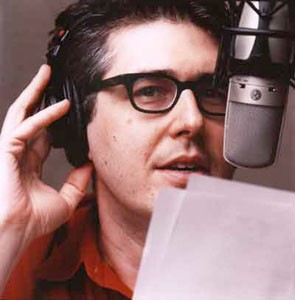‘This American Life: Lies, Sissies & Fiascos,’ a two-disc compilation of the most popular segments from ‘This American Life.’
Photograph by Richard Frank
See More Glass: Ira Glass may have a different fan base than Howard Stern, but he’s still a radio star.
Radio On
To a nation of rapt listeners, Ira Glass is a radio hero
By Sara Bir
This American Life has been on public radio for seven and a half years now, and even though an armload of interviews with the show’s host, Ira Glass, have divulged the fascinating and labor-intensive process behind the show, the behind-the-scenes details of This American Life never fail to fascinate.
Neither does Glass, a man of many words (even if about one-third of them are “um”). He’s the kind of immediately personable guy that we want to have in our circle of friends–energetic, good-natured, insightful, and quick-witted–and to the rapt audience of This American Life, for one hour every Saturday afternoon, it feels like he is. We talked to Glass recently over the phone from his office in Chicago.
Tickets for your appearance in San Rafael sold out quickly. Do you feel that you are famous, or a celebrity?
The only time I ever feel anything like that is when I come out and speak. When you’re just on the radio, nobody recognizes you. And because it’s public radio it’s not such a high-profile thing that, like, when I give my charge card to the man at the video store, he doesn’t go, “Ira Glass!” That has never happened in a lifetime of buying things. Last week for my birthday, we went to a steakhouse. The thought that I’d give my charge card to the guy and he’d say, “Wait a second, you said on your program that you didn’t eat meat!”–that would be horrifying.
After all of these years interviewing other people, does it feel weird to be interviewed?
It’s taken me a long time, actually, doing publicity for the show–like years–to be able to be interviewed by somebody and not spend the entire interview as them. I’ll hear myself answering a question, like the answer I’m giving to you now, and the thing I think is the thing the interviewer thinks: ‘Come on, get to the good part, say something I can use,’ and I’ll not only be editing the interview as it’s happening, but I’ll also be structuring the story. I’ll be thinking, “Where’s the lead?” Even as I’m saying these words, I’m thinking, “Hey, that wouldn’t be a bad lead.”
What do you think of public radio’s current content?
When I got my first internship at NPR, it was 1978; All Things Considered had been on the air for six years–it wasn’t a national institution. The ways in which it has changed since then . . . two things have happened: the reporting has gotten way better. When I started with NPR, Robert Siegel was the foreign correspondent in Europe–that was it, the entire continent, all of those countries, and I think he had to cover Russia too. So there wasn’t a lot of depth to the breaking news coverage. Whereas now, it’s prosperous and a really strong network in every way.
Where it’s kind of fallen apart, I think, is it just has less of a personality on the air. It’s like it exchanged a more charming personality for a smarter personality. What you get is clear, you understand what’s happening, you understand what it might mean. But often there’s not a lot of heart. And I feel like that’s almost a violation of the laws of radio.
[The conversation then swings to discussion of people why people like or dislike public radio.]
My girlfriend can’t abide it–can’t stand it. She feels like people talk in a condescending tone, and she doesn’t find it that interesting. When we’re in the car, we flip back and fourth. . . . If it’s in the morning, we’ll flip between Howard Stern and Morning Edition. Like a huge demographic of the audience, actually, is flipping between Howard Stern and Morning Edition.
Maybe that’s like taking fat-free milk and two percent, and mixing them together to get what you want.
I feel it’s more like taking fat-free milk and combining it with pure cream. It’s like taking matter and antimatter, and, like, clapping them together.
Ira Glass will appear at the Osher Marin Jewish Community Center’s Hoytt Theater on Thursday, April 24, at 7:30pm. 200 N. San Pedro Road, San Rafael. 415.444.8000.
From the April 24-30, 2003 issue of the North Bay Bohemian.











